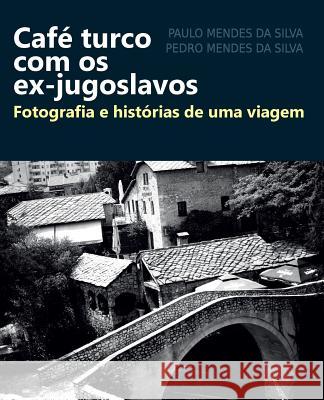Cafe turco com os ex-jugoslavos: Fotografia e historias de uma viagem » książka
Cafe turco com os ex-jugoslavos: Fotografia e historias de uma viagem
ISBN-13: 9781517480455 / Portugalski / Miękka / 2015 / 156 str.
"Cafe turco com os ex-jugoslavos" conta a historia de uma viagem de um grupo de portugueses a quatro dos paises que integravam a extinta Jugoslavia, atraves das palavras e da fotografia. O grupo visitou, por esta ordem, a Eslovenia, a Servia, a Bosnia e Herzegovina e a Croacia. O livro conta, ainda, outras historias dos ex-jugoslavos, dando a conhecer ao leitor um pouco da sua cultura, da sua gastronomia, da sua historia, das suas linguas, das suas paisagens e da sua arquitetura. Procura encontrar o que ainda une os ex-jugoslavos e o que aconteceu ao longo da historia para que acabassem politicamente separados. O ancestral cafe turco, um legado do Imperio Otomano, patrimonio imaterial da humanidade, e um dos elementos culturais que ainda unem os ex-jugoslavos, mesmo que por vezes se esconda sob designacoes distintas em paises diferentes. A viagem foi suscitada pela leitura de um exemplar com 52 anos do romance "A ponte sobre o Drina," do escritor jugoslavo Ivo Andric, emprestado pelo avo dos autores. Os viajantes foram ver com os seus proprios olhos a ponte e o rio Drina que o livro descreve, na cidade de Visegrad, hoje situada na Republica Servia da Bosnia, na Bosnia e Herzegovina. English description: "Cafe turco com os ex-jugoslavos" ("Having a Turkish coffee with the former Yugoslavs") is the nonfiction story of a group of Portuguese travelers setting out on a journey to four countries that once belonged to the former Yugoslavia, through words and photographs. The trip included Slovenia, Serbia, Bosnia and Herzegovina and Croatia. The book also tells other stories about former Yugoslavians, letting the reader learn a little more about their culture, their food, their history, their languages, their landscapes and their architecture. It attempts to find out whether there are still cultural features uniting former Yugoslavs to this day and what happened throughout history for them to end up politically separated. The ancient Turkish coffee, a legacy of the Ottoman Empire, which belongs to the UNESCO world heritage list, is one of the cultural features that still appear to unite former Yugoslavs, even though it sometimes hides itself behind distinct names in different countries. The group trip was sparked by the book "The Bridge on the Drina," by Nobel Prize winner Ivo Andric. One of the authors read a 52 year old edition of this novel, borrowed from his grandfather and felt he and his friends had to see with their own eyes the real bridge and the Drina river the book describes, in the city of Vi egrad, located today in Republika Srpska, Bosnia and Herzegovina. Paulo Mendes da Silva and Pedro Mendes da Silva are Portuguese and were born in Luanda, Angola. They are compulsive travelers, computer scientists and twin brothers. Pedro Mendes da Silva shoots and Paulo Mendes da Silva writes."
Zawartość książki może nie spełniać oczekiwań – reklamacje nie obejmują treści, która mogła nie być redakcyjnie ani merytorycznie opracowana.











